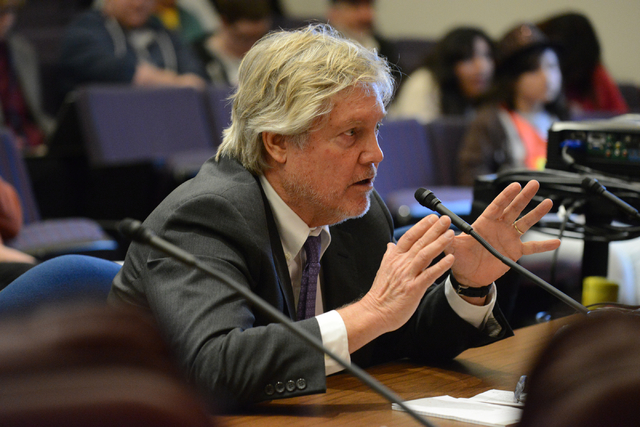Reconsidering term limits won’t happen this year
Back in the heady days of the mid- to late-1990s, Nevada’s voters were in a particularly anti-democratic mood.
Swept up in a frenzy of Republicanism occasioned by new House Speaker Newt Gingrich’s Contract with America, Nevada gave in to the fad of the times, passing 12-year term limits on state and local lawmakers and imposing a requirement that the Legislature muster a two-thirds supermajority in order to raise taxes.
Those two ideas have caused nothing but trouble ever since, and the state would be immeasurably improved by their immediate repeal. But it doesn’t look like we’re going to get the chance.
State Sen. Tick Segerblom, D-Las Vegas, a veteran of Nevada’s Assembly and Senate, brought Senate Joint Resolution 18 this year, a measure that would begin the five-year process of repealing term limits. Had the resolution been approved, it would have had to return to the 2017 Legislature for another vote and then gone before voters in 2018.
“During the last 20 years, in my opinion, the legislative branch has basically ceded a lot of its authority to the two other branches of government,” Segerblom said during the brief hearing on the measure. “Term limits has hurt our institutional value in the system.”
He’s right: Nevada’s Legislature should be its strongest branch, directly elected by the people every two or four years, empowered with the ability to write and repeal laws. But with a limit of 120 days every other year, a full-time governor and full-time judicial branch (now with an appellate court!), Nevada’s Legislature is actually the weakest branch. Add to that the weakness imposed by term limits — the inability to retain its veterans — and the Legislature is even weaker.
Segerblom suggested that now, after 20 years of term limits, the voters might think differently about what they did in 1994 and 1996, when the constitutional amendments approving term limits passed. (That’s not entirely accurate: While limits were finally approved in 1996, they didn’t actually go into effect for most officials until 1998 and were only applied prospectively.)
Back in the 1990s, voters were fairly clear: Question 9 passed in 1994 by a sizable margin of 70.4 percent to 29.6 percent, and again in 1996 by a less robust 54.3 percent to 45.7 percent. (By contrast, consider that the two-thirds tax amendment passed 78.1 percent to 21.9 percent in 1994 and 70.5 percent to 29.5 percent in 1996.)
Still, term limits passed comfortably, and probably would again if Segerblom had been successful in persuading the Senate’s Legislative Operations and Elections Committee to pass his resolution. (It was one of the 262 bills and resolutions that failed to meet Friday’s committee deadline, and is considered dead for the rest of the session.)
Then again, maybe not: According to testimony at the April 8 hearing for Segerblom’s resolution, Idaho and Utah (not exactly bastions of wild-eyed liberalism) have reversed their term-limits measures, and they’ve been enjoined by courts in Washington state, Oregon, Wyoming and Massachusetts. Perhaps Nevada voters would change their minds.
And it’s not like they haven’t imposed term limits themselves. In November’s election, 10 Assembly seats held by Democrats fell to Republicans, limiting the careers of Democratic lawmakers such as Jason Frierson, Andy Eisen, Lesley Cohen and Paul Aizley. In the state Senate, Republican Becky Harris replaced Democrat Justin Jones.
None of those lawmakers faced a legal term limit; they just faced voters wanting a change.
By contrast, had there not been term limits, Mayor Oscar Goodman would very likely still be sitting in the center seat at Las Vegas City Hall, waging rhetorical battle with Councilmen Bob Beers (forced from the state Senate by an election, not term limits) and Bob Coffin (who stayed in the Legislature until the law said he had to go).
And if the people want an Oscar Goodman to stay longer than 12 years, or a state Assembly member to leave after just a few, who are we to argue? But it’s long past time to give voters a chance to reconsider the automatic expulsions that more often than not deprive them of smart, experienced lawmakers. Too bad that process won’t get started anytime soon.
Steve Sebelius is a Las Vegas Review-Journal political columnist who blogs at SlashPolitics.com. Follow him on Twitter (@SteveSebelius) or reach him at 702-387-5276 or ssebelius@reviewjournal.com.

RELATED STORIES
Nevada ‘tough-on-crime’ bills could force Jean prison to reopen
Reno Assemblyman Randy Kirner loses cop association support
NLV mayor backs bankruptcy power for cities, counties
Nevada Senate approves minimum wage increase bill
Nevada legislators urged to restart cloud seeding amid drought
Bill to boost maximum speed limit to 80 mph advances
See all of our coverage: 2015 Nevada Legislature.






















